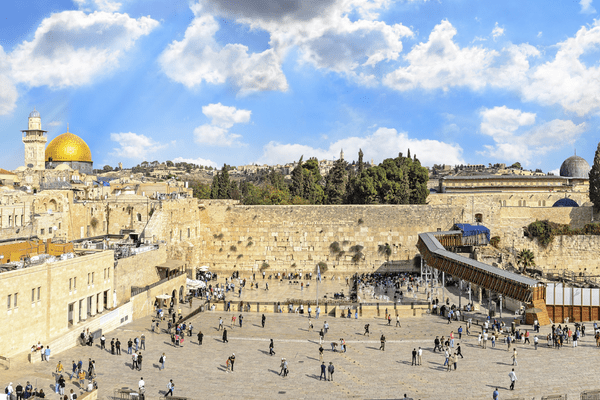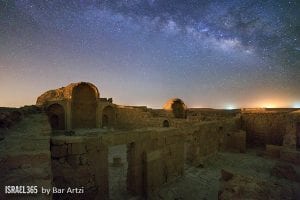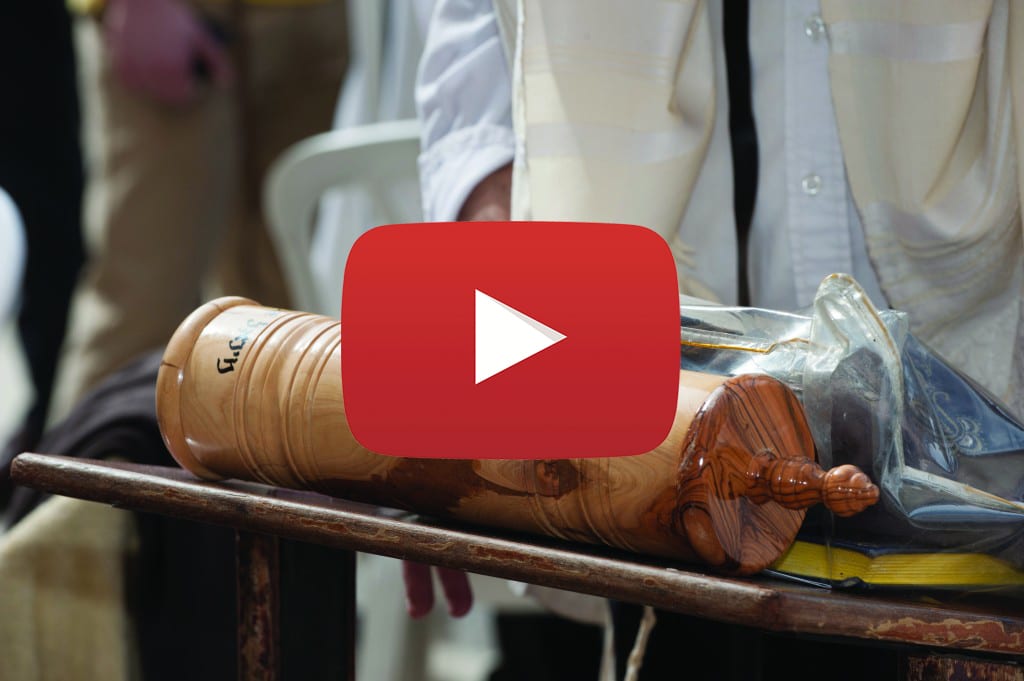
TORAH
NEVI'IM
KETUVIM
Chapter 3
Translation and Transliteration of
Listen to this chapter in Hebrew:
- Commentary
- Buy E-book
- Buy the Israel Bible
1Some time afterward, King Ahasuerus promoted Haman son of Hammedatha the Agagite; he advanced him and seated him higher than any of his fellow officials.
אאַחַר הַדְּבָרִים הָאֵלֶּה גִּדַּל הַמֶּלֶךְ אֲחַשְׁוֵרוֹשׁ אֶת־הָמָן בֶּן־הַמְּדָתָא הָאֲגָגִי וַיְנַשְּׂאֵהוּ וַיָּשֶׂם אֶת־כִּסְאוֹ מֵעַל כָּל־הַשָּׂרִים אֲשֶׁר אִתּוֹ׃
2All the king's courtiers in the palace gate knelt and bowed low to Haman, for such was the king's order concerning him; but Mordechai would not kneel or bow low.
בוְכָל־עַבְדֵי הַמֶּלֶךְ אֲשֶׁר־בְּשַׁעַר הַמֶּלֶךְ כֹּרְעִים וּמִשְׁתַּחֲוִים לְהָמָן כִּי־כֵן צִוָּה־לוֹ הַמֶּלֶךְ וּמָרְדֳּכַי לֹא יִכְרַע וְלֹא יִשְׁתַּחֲוֶה׃
3Then the king's courtiers who were in the palace gate said to Mordechai, “Why do you disobey the king's order?”
גוַיֹּאמְרוּ עַבְדֵי הַמֶּלֶךְ אֲשֶׁר־בְּשַׁעַר הַמֶּלֶךְ לְמָרְדֳּכָי מַדּוּעַ אַתָּה עוֹבֵר אֵת מִצְוַת הַמֶּלֶךְ׃
4When they spoke to him day after day and he would not listen to them, they told Haman, in order to see whether Mordechai's resolve would prevail; for he had explained to them that he was a Yehudi.
דוַיְהִי באמרם [כְּאָמְרָם] אֵלָיו יוֹם וָיוֹם וְלֹא שָׁמַע אֲלֵיהֶם וַיַּגִּידוּ לְהָמָן לִרְאוֹת הֲיַעַמְדוּ דִּבְרֵי מָרְדֳּכַי כִּי־הִגִּיד לָהֶם אֲשֶׁר־הוּא יְהוּדִי׃
5When Haman saw that Mordechai would not kneel or bow low to him, Haman was filled with rage.
הוַיַּרְא הָמָן כִּי־אֵין מָרְדֳּכַי כֹּרֵעַ וּמִשְׁתַּחֲוֶה לוֹ וַיִּמָּלֵא הָמָן חֵמָה׃
6But he disdained to lay hands on Mordechai alone; having been told who Mordechai's people were, Haman plotted to do away with all the Yehudim, Mordechai's people, throughout the kingdom of Ahasuerus.
ווַיִּבֶז בְּעֵינָיו לִשְׁלֹח יָד בְּמָרְדֳּכַי לְבַדּוֹ כִּי־הִגִּידוּ לוֹ אֶת־עַם מָרְדֳּכָי וַיְבַקֵּשׁ הָמָן לְהַשְׁמִיד אֶת־כָּל־הַיְּהוּדִים אֲשֶׁר בְּכָל־מַלְכוּת אֲחַשְׁוֵרוֹשׁ עַם מָרְדֳּכָי׃
7In the first month, that is, the month of Nisan, in the twelfth year of King Ahasuerus, pur—which means “the lot”—was cast before Haman concerning every day and every month, [until it fell on] the twelfth month, that is, the month of Adar.
זבַּחֹדֶשׁ הָרִאשׁוֹן הוּא־חֹדֶשׁ נִיסָן בִּשְׁנַת שְׁתֵּים עֶשְׂרֵה לַמֶּלֶךְ אֲחַשְׁוֵרוֹשׁ הִפִּיל פּוּר הוּא הַגּוֹרָל לִפְנֵי הָמָן מִיּוֹם לְיוֹם וּמֵחֹדֶשׁ לְחֹדֶשׁ שְׁנֵים־עָשָׂר הוּא־חֹדֶשׁ אֲדָר׃
8Haman then said to King Ahasuerus, “There is a certain people, scattered and dispersed among the other peoples in all the provinces of your realm, whose laws are different from those of any other people and who do not obey the king's laws; and it is not in Your Majesty's interest to tolerate them.
חוַיֹּאמֶר הָמָן לַמֶּלֶךְ אֲחַשְׁוֵרוֹשׁ יֶשְׁנוֹ עַם־אֶחָד מְפֻזָּר וּמְפֹרָד בֵּין הָעַמִּים בְּכֹל מְדִינוֹת מַלְכוּתֶךָ וְדָתֵיהֶם שֹׁנוֹת מִכָּל־עָם וְאֶת־דָּתֵי הַמֶּלֶךְ אֵינָם עֹשִׂים וְלַמֶּלֶךְ אֵין־שֹׁוֶה לְהַנִּיחָם׃
9If it please Your Majesty, let an edict be drawn for their destruction, and I will pay ten thousand kikarot of silver to the stewards for deposit in the royal treasury.”
טאִם־עַל־הַמֶּלֶךְ טוֹב יִכָּתֵב לְאַבְּדָם וַעֲשֶׂרֶת אֲלָפִים כִּכַּר־כֶּסֶף אֶשְׁקוֹל עַל־יְדֵי עֹשֵׂי הַמְּלָאכָה לְהָבִיא אֶל־גִּנְזֵי הַמֶּלֶךְ׃
10Thereupon the king removed his signet ring from his hand and gave it to Haman son of Hammedatha the Agagite, the foe of the Yehudim.
יוַיָּסַר הַמֶּלֶךְ אֶת־טַבַּעְתּוֹ מֵעַל יָדוֹ וַיִּתְּנָהּ לְהָמָן בֶּן־הַמְּדָתָא הָאֲגָגִי צֹרֵר הַיְּהוּדִים׃
11And the king said, “The money and the people are yours to do with as you see fit.”
יאוַיֹּאמֶר הַמֶּלֶךְ לְהָמָן הַכֶּסֶף נָתוּן לָךְ וְהָעָם לַעֲשׂוֹת בּוֹ כַּטּוֹב בְּעֵינֶיךָ׃
12On the thirteenth day of the first month, the king's scribes were summoned and a decree was issued, as Haman directed, to the king's satraps, to the governors of every province, and to the officials of every people, to every province in its own script and to every people in its own language. The orders were issued in the name of King Ahasuerus and sealed with the king's signet.
יבוַיִּקָּרְאוּ סֹפְרֵי הַמֶּלֶךְ בַּחֹדֶשׁ הָרִאשׁוֹן בִּשְׁלוֹשָׁה עָשָׂר יוֹם בּוֹ וַיִּכָּתֵב כְּכָל־אֲשֶׁר־צִוָּה הָמָן אֶל אֲחַשְׁדַּרְפְּנֵי־הַמֶּלֶךְ וְאֶל־הַפַּחוֹת אֲשֶׁר עַל־מְדִינָה וּמְדִינָה וְאֶל־שָׂרֵי עַם וָעָם מְדִינָה וּמְדִינָה כִּכְתָבָהּ וְעַם וָעָם כִּלְשׁוֹנוֹ בְּשֵׁם הַמֶּלֶךְ אֲחַשְׁוֵרֹשׁ נִכְתָּב וְנֶחְתָּם בְּטַבַּעַת הַמֶּלֶךְ׃
13Accordingly, written instructions were dispatched by couriers to all the king's provinces to destroy, massacre, and exterminate all the Yehudim, young
and old, children and women, on a single day, on the thirteenth day of the twelfth month—that is, the month of Adar—and to plunder their possessions.
יגוְנִשְׁלוֹחַ סְפָרִים בְּיַד הָרָצִים אֶל־כָּל־מְדִינוֹת הַמֶּלֶךְ לְהַשְׁמִיד לַהֲרֹג וּלְאַבֵּד אֶת־כָּל־הַיְּהוּדִים מִנַּעַר וְעַד־זָקֵן טַף
![]() 3:13 To destroy, massacre, and exterminate all the Yehudim
3:13 To destroy, massacre, and exterminate all the Yehudim
Usually, the Torah gives us the reason why an individual, or the nation as a whole, are punished. Megillat Esther, however, does not explicitly state what the people did to deserve the threat of annihilation. When viewed in historical context, it becomes clear that the Jews of Shushan were guilty for not having returned to Eretz Yisrael even though they had the opportunity to do so. After the Persian king Cyrus conquered the Babylonians, he allowed the Children of Israel to return to the Land of Israel and begin reconstruction of the Beit Hamikdash. However, a mere 42,360 returned to Yerushalayim (Ezra 2:64) while close to a million remained in Babylonia. The generation was therefore punished for their lack of enthusiasm towards returning to Israel. This teaches us the importance of making every effort to embrace the land and to physically return to it whenever possible.
14The text of the document was to the effect that a law should be proclaimed in every single province; it was to be publicly displayed to all the peoples, so that they might be ready for that day.
ידפַּתְשֶׁגֶן הַכְּתָב לְהִנָּתֵן דָּת בְּכָל־מְדִינָה וּמְדִינָה גָּלוּי לְכָל־הָעַמִּים לִהְיוֹת עֲתִדִים לַיּוֹם הַזֶּה׃
15The couriers went out posthaste on the royal mission, and the decree was proclaimed in the fortress Shushan. The king and Haman sat down to feast, but the city of Shushan was dumfounded.
טוהָרָצִים יָצְאוּ דְחוּפִים בִּדְבַר הַמֶּלֶךְ וְהַדָּת נִתְּנָה בְּשׁוּשַׁן הַבִּירָה וְהַמֶּלֶךְ וְהָמָן יָשְׁבוּ לִשְׁתּוֹת וְהָעִיר שׁוּשָׁן נָבוֹכָה׃








